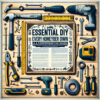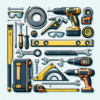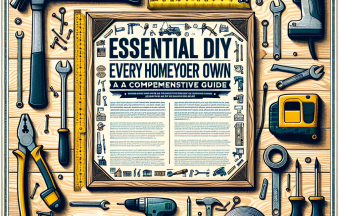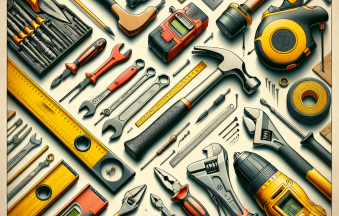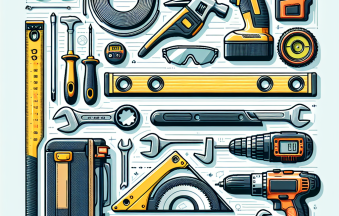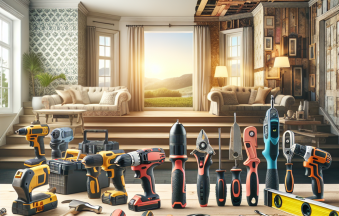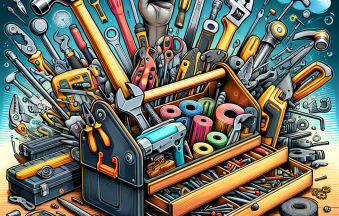Diving into the realm of DIY can be both thrilling and intimidating. With the appropriate tools at your fingertips, you can address anything from minor home fixes to comprehensive renovations. Let’s examine key DIY tools across different categories to make sure you’re fully prepared for your forthcoming endeavor.
Home Tools
When embarking on your DIY journey, it’s vital to collect some fundamental home tools. Consider acquiring a robust ladder, which is essential for accessing elevated areas, whether you’re replacing a light fixture or painting ceilings. Furthermore, possessing a reliable set of hand tools, comprising a claw hammer, screwdrivers (both Phillips and flathead), and pliers, will facilitate a wide range of tasks. A cordless drill is another multifunctional tool that you’ll find invaluable—it can be utilized for everything from assembling furniture to drilling holes for shelving.
Construction Materials
Next, let’s delve into construction materials. If you’re intending any structural changes or home enhancements, gather necessary supplies like plywood, drywall, and various types of lumber. Remember to include safety equipment—gloves, goggles, and a dust mask are crucial for protecting yourself while handling building materials. In addition, a dependable utility knife for trimming materials to size, along with a tape measure to guarantee precision for every cut, is essential.
Frequently Asked Questions:
- What kind of wood should I choose for furniture? Plywood is excellent for strength and longevity, while softwoods like pine are suitable for quick tasks.
- Is a saw required for minor projects? While a handsaw will suffice, a power saw can save you time and energy on larger cuts.
Electrical Equipment
In the realm of DIY electrical work, safety must be your foremost concern. A voltage tester is vital for confirming the presence of power before engaging in any electrical task. A wire stripper assists in preparing wires for connections, while a multimeter is essential for diagnosing electrical circuits. Always ensure to switch off the power at the circuit breaker prior to commencing any electrical undertaking.
Fixtures & Fasteners
No DIY endeavor is truly complete without sufficient fixtures and fasteners. Stock a variety of nails, screws, anchors, and washers in an accessible organizer for quick retrieval. For larger projects, consider buying in bulk to save costs. Furthermore, possessing a tool like a stud finder can prevent much frustration when mounting heavy items on walls.
Helpful Tips:
- How can I determine the size of screws to purchase? Always opt for screws that are longer than the material you are securing but not too long that they penetrate through the other side.
- What distinguishes wood screws from drywall screws? Wood screws feature coarse threads for gripping wooden fibers, whereas drywall screws have finer threads and a bugle-shaped head for effortless installation.
Kitchen & Bathroom
Culinary and bathroom projects often necessitate specialized tools. For the kitchen, a plunger is essential for addressing blocked sinks. In the bathroom, a caulking gun aids in ensuring a watertight seal around sinks and tubs. Additionally, don’t underestimate the value of a quality set of wrenches for tightening plumbing fixtures! This toolkit will be invaluable for both maintenance and renovation efforts.
Light Bulbs & LEDs
Lighting can significantly transform the mood of a space. When selecting light bulbs, LED lights offer an energy-efficient choice that outlasts traditional incandescent bulbs. Ensure you have a range of bulb types on hand—from standard to specialty bulbs designed for fixtures like recessed lighting. A lightweight stepladder can be useful for accessing high light fixtures when it’s time to replace bulbs.
Lighting & Fans
Alongside light bulbs, contemplate investing in ceiling fans or floor lamps to enhance airflow and add flair to your areas. When installing a ceiling fan, verify weight limits and confirm that the ceiling mount is secure. You’ll require basic hand tools and possibly a voltage tester for safely connecting the wiring.
Measuring Instruments
Precise measurements are essential for a successful DIY project. Instruments like a measuring tape, carpenter’s square, and a level are indispensable in any DIY toolkit. A laser level can be especially useful for tasks demanding exact alignment, such as mounting shelves or displaying artwork.
Measuring Tips:
- What’s the most effective way to measure lengthy distances? Utilize a measuring wheel for outdoor tasks, or enlist a helper when operating indoors.
- How can I ensure my measurements are precise? Always measure twice before cutting or buying materials!
Painting & Wall Materials
Last but not least, let’s discuss paint! Whether you’re refreshing walls or undertaking a complete color makeover, possessing a quality paintbrush and roller is crucial. A reliable drop cloth will safeguard your floors, while painter’s tape helps secure clean edges around trim and borders. Don’t forget a sturdy paint tray for easy access during your task, and always consider the finish type of paint based on the room’s purpose—kitchen and bathroom require more washable finishes, while living areas may benefit from a matte appearance.
With these fundamental DIY tools available to you, you’ll be well-prepared for whatever home enhancement project comes your way. Remember, the journey of DIY is a valuable learning experience, so don’t hesitate to experiment and discover what works best for you and your residence.





